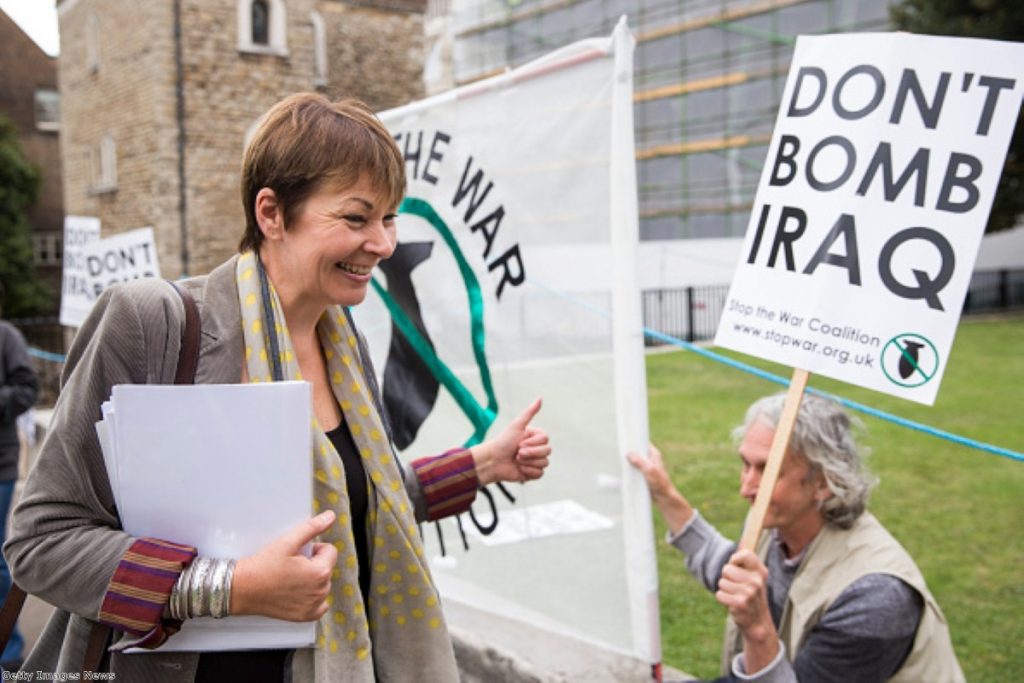Why Labour’s anti-Green strategy isn’t working
It's now been over three months since the launch of Labour's anti-Green party strategy.
The unit, set up by shadow justice secretary Sadiq Khan was designed to reverse the leakage of Labour supporters to the Greens and win back more votes from Labour's left. So how is it going?
Well since the unit launched, support for the Greens has actually gone up.
Nationally the party is now regularly polling ahead of the Lib Dems, with one poll released by Lord Ashcroft today putting the party on an all time-high of 11%.


The party is also building support locally. In the Green's only parliamentary seat in Brighton, they have gone from being one point behind Labour to ten points ahead. While much of that support has come from former Lib Dem and non-voters, the number of former Labour voters planning to vote Green in the constituency has almost doubled since June.
The party's ability to translate this support into votes is also improving. Last week they revealed that they have more members than either the Lib Dems or Ukip. It is this fact above all which could prove crucial to both the Greens and Labour's chances in May. In previous elections the party has failed to translate support in the polls into support at the ballot box. The surge in membership suggests that could be about to change.
So why isn't Labour's strategy to kill off the Greens working?
Take look at this YouGov poll from yesterday. Voters were asked which minor party they would like to hold the "balance of power" in a possible hung parliament.
More people want the Greens in a coalition government than any other minor party. pic.twitter.com/qR9JaeaFBD
— Adam Bienkov (@AdamBienkov) January 19, 2015
The answers for the Greens were particularly revealing. Natalie Bennett's party were the first choice among voters with 34% saying it would be a "good thing" to have them in government and just 26% saying it would be a bad thing. Crucially this support was even higher among Labour supporters, with 45% saying it would be a good thing to have the greens in coalition and just 20% disagreeing.
In a separate question just ten per cent of Labour's voters from 2010 said they were willing to vote tactically in order to keep a party "I don't like" out of power, while 83% said they would stick with their first choice
This shows exactly why Labour's argument that if people 'vote Green get blue' just isn't working.
.@natalieben unveils new @TheGreenParty poster for #leadersdebates #InviteTheGreens pic.twitter.com/58UoycaS2D
— The Green Party (@TheGreenParty) January 19, 2015
Five years of coalition government is transforming the way the electorate looks at politics. With another hung parliament now a racing certainty with the bookies, voters know that a vote for the smaller parties is no longer necessarily a wasted one.
A vote for the Greens is also seen as a guilt-free one in a way which a vote for Ukip is not. While overall support for Ukip is significantly higher than for the Greens, a majority of voters do not want to see them in government. Fifty-two per cent of voters told YouGov that it would be bad thing for Nigel Farage's party to hold the balance of power. Crucially 46% of Tory voters said the same.
It is this last figure which explains the difficulty for Labour. It suggests that while there is much to gain for the Tories in trying to scare their voters away from Ukip, Labour have much less chance of success against their Green flank.
It is now possible to see the prospect of anti-Ukip tactical voting in May, but much more difficult to see the possibility of people rushing out to keep the Greens from office.
So what if anything can Labour do to stem the Green surge? Some Labour activists will be tempted to continue to go on the attack. To point to the party's record in Brighton or brand them as left-wing "extremists" unworthy of being in power.
While tempting, the latest polling suggests this strategy is simply not working and may even have backfired.
A better strategy would be to look at the reasons why former Labour voters are going to the Greens in the first place.
I would argue that the Greens are benefiting from three main factors.
1. The collapse of the Lib Dems
2. The perceived narrowing political gap between the two main political parties
3. The Green's support for bold eye-catching policies on things like nationalised rail and low pay.
The first factor is the main reason Ed Miliband's party are still narrowly ahead in most opinion polls. If Labour could do something about the other two factors, they would have far less to fear from the rise of the Greens.









